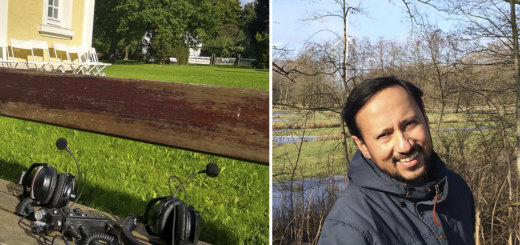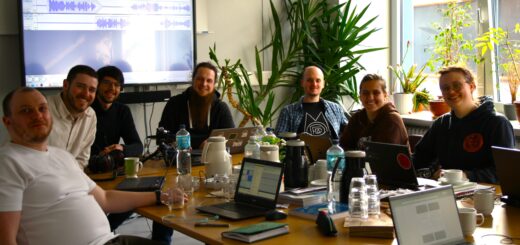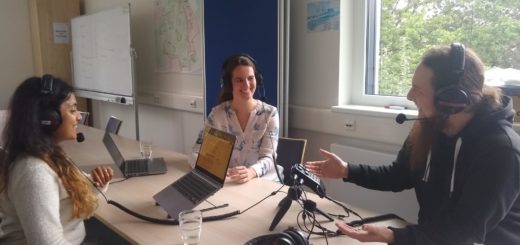Podcast Episode 4: Caroline Heneka
In our fourth podcast episode, Caroline Heneka, astrophysicist and postdoctoral researcher at the University of Hamburg and the Quantum Universe Cluster of Excellence, talks about new telescopes and how to look for the first ever stars and galaxies.

Recording Podcasts at the Hamburg Observatory
Behind this and the upcoming episode stands a trip that I took together with Michael to the Hamburg Observatory in Bergedorf. From the western part of Hamburg, where I work and live, it took me like an hour by car to get there. I picked up Michael about half-way, in the City Center and then continued east to reach this remote location. It was magical from the moment Michael and I got out of the car.

The observatory is located in a park on a little hill. There you find really nice old telescope domes and some other amazing little old buildings surrounded by lots of green grass.
The afternoon we spent there was a perfect warm autumn sunshine day, so the trees of this park were shining in spectacular colors. Believe me, this type of wheather is really rare in the Hamburg area. 🙂

When we slowly walked through this wondreous park, I rang Caroline to tell her we arrived. “Oh, I can see you” – she told me and a window in the first floor of one of the beautiful old buildings opened. She waved and came down to meet us.
Soon enough Pranjal also walked over to us from a different buidlung. Oh yes, absolutely did I want to see more of this place, so the four of us started a little tour and to my amazement entered a few of the old observatory domes.
You can listen to some of the fun that we had in the beginning of this episode, in which Caroline talks about the universe and what we can learn about it with some of these telescopes – or actually rather newer and sophisticated ones. 🙂
Content

Many riddles remain to be solved in astronomy and astrophysics. To learn more about our Universe, new telescopes, instruments and astronomical missions are continuously planned and prepared for. In this episode we chat about how ideas of new telescopes come into being and why in the near future it might be possible to explore a frontier of astronomy, the so-called Cosmic Dawn. This Cosmic Dawn is the cosmic epoch when the very first generation of stars and galaxies formed, ending the before ‘Dark Ages’.

















